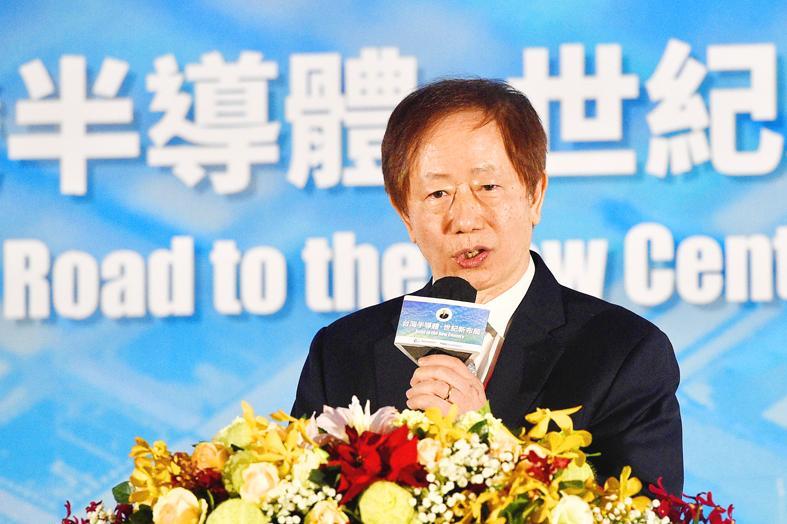Mark Liu (劉德音), former chairman of Taiwan Semiconductor Manufacturing Co (TSMC), has founded an academic center at the University of California, Berkeley to enhance US tech competitiveness.
The Technology Competitiveness and Industrial Policy Center (TCIP), founded and supported by Liu, was announced by the university in a news release on Thursday last week.
“Over the past several decades, globalization has decoupled upstream research from downstream manufacturing of high-technology products. As a result, new innovations do not necessarily translate into wealth creation,” Liu said in the statement.

Photo: George Tsorng, Taipei Times
“With the ever-increasing dependence of society on technology, this separation is eroding our nation's technology leadership, the cornerstone of economic power and security,” Liu said.
“A national strategy is needed to strengthen the pipeline from research to product development and manufacturing, and to ensure end-market access,” he said.
The TCIP would provide “expert, independent scholarly advice to policymakers and lawmakers on technology policy development” to ensure US leadership in areas such as tech research and development and advanced manufacturing, the release said.
The new center was established under the university's College of Engineering and would convene experts in technology, economics and policy from academia, the industrial sector and non-profits, the release said.
After the recent “disruption” from China's introduction of DeepSeek, it is “increasingly imperative to restore US leadership in advanced technology — including artificial intelligence — and this center will accelerate progress toward this goal,” said S. Shankar Sastry, a computer science professor at the university who would serve as the center's faculty director.
Liu, who was born and raised in Taiwan and attended graduate school at UC Berkeley, served as chairman of TSMC from 2018 to last year.

A small number of Taiwanese this year lost their citizenship rights after traveling in China and obtaining a one-time Chinese passport to cross the border into Russia, a source said today. The people signed up through Chinese travel agencies for tours of neighboring Russia with companies claiming they could obtain Russian visas and fast-track border clearance, the source said on condition of anonymity. The travelers were actually issued one-time-use Chinese passports, they said. Taiwanese are prohibited from holding a Chinese passport or household registration. If found to have a Chinese ID, they may lose their resident status under Article 9-1

Taiwanese were praised for their composure after a video filmed by Taiwanese tourists capturing the moment a magnitude 7.5 earthquake struck Japan’s Aomori Prefecture went viral on social media. The video shows a hotel room shaking violently amid Monday’s quake, with objects falling to the ground. Two Taiwanese began filming with their mobile phones, while two others held the sides of a TV to prevent it from falling. When the shaking stopped, the pair calmly took down the TV and laid it flat on a tatami mat, the video shows. The video also captured the group talking about the safety of their companions bathing

A classified Pentagon-produced, multiyear assessment — the Overmatch brief — highlighted unreported Chinese capabilities to destroy US military assets and identified US supply chain choke points, painting a disturbing picture of waning US military might, a New York Times editorial published on Monday said. US Secretary of Defense Pete Hegseth’s comments in November last year that “we lose every time” in Pentagon-conducted war games pitting the US against China further highlighted the uncertainty about the US’ capability to intervene in the event of a Chinese invasion of Taiwan. “It shows the Pentagon’s overreliance on expensive, vulnerable weapons as adversaries field cheap, technologically

Starting on Jan. 1, YouBike riders must have insurance to use the service, and a six-month trial of NT$5 coupons under certain conditions would be implemented to balance bike shortages, a joint statement from transportation departments across Taipei, New Taipei City and Taoyuan announced yesterday. The rental bike system operator said that coupons would be offered to riders to rent bikes from full stations, for riders who take out an electric-assisted bike from a full station, and for riders who return a bike to an empty station. All riders with YouBike accounts are automatically eligible for the program, and each membership account